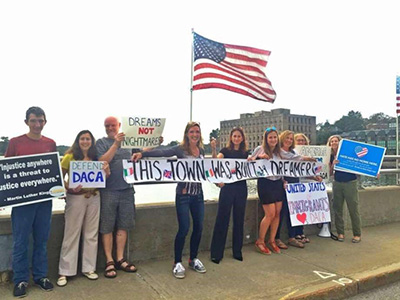
Photo: Contributed Photo; Protestors in support of DACA in Westport in 2017.
While the U.S. Supreme Court’s recent decision gives “Dreamers” a chance to relax, the question is, for how long?
About 700,000 or so immigrant youth are known as “Dreamers” and are allowed to remain in this country under the federal Deferred Action for Childhood Arrivals, or DACA, program, a program the court said can remain in effect — for now.
The DACA program shields immigrants who came to the United States illegally as children. Those accepted into DACA not only have protection from deportation, but they become eligible for work authorization, a Social Security number and a driver’s license. The Trump administration has fought vigorously to terminate DACA, established by President Obama in 2012.
Keep in mind that the DACA recipients were brought here as children. They went to school here. They have contributed to our society. They are our neighbors and our friends. They pay taxes and contribute to our economy. Many have known no life outside of the U.S. They are, in effect, Americans in every way except, of course, legally.
While these “Dreamers” are breathing a sigh of relief, they aren’t the only ones to benefit from the court’s decision. Many Americans don’t realize the broader impact of this decision and the importance these workers have on our economy.
At least for now, employers can be assured they won’t be losing these employees immediately. Some estimates indicate that replacing DACA workers with new employees would cost $6.3 billion in hiring and training costs. Clearly, that is a burden that American business does not need, particularly at this time when the economy is contracting.
In Connecticut, DACA has allowed many people to live, go to school and work here legally. Estimates range from 5,000 and up. Ending DACA is estimated to cost Connecticut $315.3 million in losses annually — including lost tax revenue, lost spending at Connecticut retailers, lost revenue at state colleges and reduced revenue at just about every aspect of Connecticut business.
DACA recipients are teachers and health care providers. They are business owners. They are hourly workers. And they are students. Since the program was established these “Dreamers” have bought homes and joined the workforce. If the DACA recipients were deported, the federal government would lose about $90 billion in taxes.
Even more stifling than the economic cost of ending DACA, is, of course, the huge emotional impact of deportation. Many of the individuals in the program have spent most of their lives in the United States. What ever happened to our belief in the quote on the Statue of Liberty, “Give me your tired, your poor, your huddled masses yearning to breathe free”?
Unfortunately, there are still many uncertainties about the future of DACA.
While the U.S. Supreme Court decision rejects the Trump administration’s 2017 attempt to end DACA, the decision is a Band-Aid, as the court did not rule on Trump’s executive authority to rescind DACA. While the administration did not file for a re-hearing, it also appears that officials are refusing to implement and restore the program. The administration recently announced it would limit renewals from deportation to one year, instead of the usual two, and not accept new applications. According to the National Immigration Law Center, first-time applicants interested in applying should consult an attorney or Department of Justice accredited representative to get an individualized assessment on their DACA eligibility and any risks before applying.
There is little question that DACA’s future is in limbo. The longer this stalemate continues, the more adverse the impact for these “Dreamers.” The uncertainty of DACA’s future can have negative implications for the employee-employer relationship, too. Employers may wonder whether they should hire those in the DACA program. They may think: “What’s going to happen down the road? Do I want to train someone if two years down the road DACA will be destroyed?” Such discrimination is illegal. Employers, by law, must treat DACA employees the same as everyone else.
For now, the DACA program is legally intact. But let’s hope, for the sake of our country, it stays that way.
Jessica A. Slippen is an attorney with Stratford-based Mitchell and Sheahan. She handles employment litigation matters before state and federal courts and administrative agencies and can be reached at 203-527-0190 or [email protected].
Other Reference Links:
https://www.ctpost.com/opinion/article/Opinion-DACA-decision-benefits-more-than-just-15466760.php


https://www.thehour.com/opinion/article/Opinion-DACA-decision-benefits-more-than-just-15466760.php



https://www.newstimes.com/opinion/article/Opinion-DACA-decision-benefits-more-than-just-15466760.php




